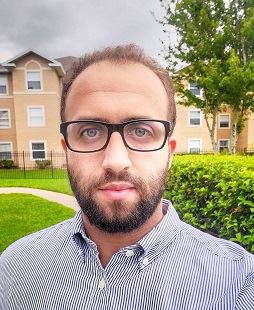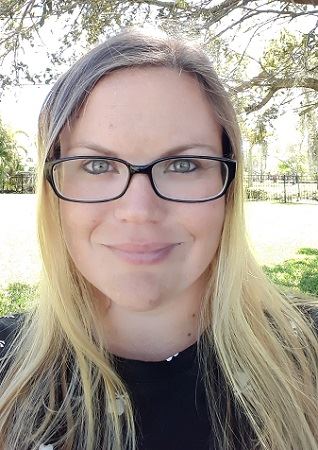 |
James Javaruski, Florida Gulf Coast University. James is pursuing his master’s degree in environmental studies. Having lived in Fort Myers for the past 13 years, James has had a front seat to the consistent and widespread development of the area. Wanting to help gather more information on the environmental impacts of this development, he has gotten involved in a variety of projects ranging from tracking the flow of nutrients and pesticides through the Caloosahatchee-Estero Bay watershed to microplastic distributions in Lee and Charlotte County waterways. James’ thesis work focuses on the preservation and potential remobilization of red tide toxins deposited in shallow Southwest Florida coastal sediments. Upon completion of his master’s degree, James intends to earn a PhD in chemical oceanography with a focus on organic toxins.
|
 |
Ahmed Nasr, University of Central Florida. Ahmed is a PhD student in the Department of Civil, Environmental, and Construction Engineering and is interested in hydrology, coastal engineering, and flood risk management. For his PhD dissertation, Ahmed is researching the broad topic of compound flooding where different flooding drivers (coastal, fluvial, and/or pluvial) occur concurrently or in close succession and thus exacerbating impacts. Ahmed is studying the dependence between those flooding drivers at various coastal locations around the U.S. coastline with several communities in Florida. This will lead to improved understanding and increase resilience in coastal communities. Ahmed obtained his master’s degree in flood risk management from IHE Delft Institute for Water Education in the Netherlands and his bachelor’s degree in civil engineering (with honors) from Cairo University in Egypt. Ahmed is interested in applied research that can benefit the scientific and engineering communities and wishes to pursue a career as an academic and consultant in flood risk management.
|
 |
Cierra Braga, Florida Institute of Technology. Cierra is a PhD student at the Florida Institute of Technology studying Oceanography. As someone who has grown up in Florida, the impacts of invasive species on the environment in both terrestrial and aquatic habitats has been a notable topic discussed throughout her entire life. Cierra is currently researching more environmentally friendly applications for biofouling prevention in our marine environment compared to the common chemical-based paints which can leach into the surrounding water column. Invasive species can be transported from one location to another via ship hulls and ballast water, and as such, biofouling is a concern in ports all over the world that have sensitive ecosystems and have the potential to be significantly altered due to the introduction of a non-native organism that lacks local predators. One of these more environmentally friendly biofouling prevention methods that is currently being investigated as a viable application is ultraviolet C light (UVC). Cierra’s dissertation research focuses on using UVC light as a biofouling prevention method and will investigate the impacts of UVC exposure on both target and non-target organisms. In addition to her studies, Cierra has worked as an environmental scientist and as an education program staff member at a zoological facility. Future career goals are to teach and perform research in academia.
|
 |
Daniel Schroeder, Florida Gulf Coast University. Daniel was born in and has resided in Fort Myers for the past 33 years. His education, work-life, and residence have been within the same 15 square miles, which has allowed him to become greatly invested in the engineering challenges of the southwest Florida area. He is passionate about the sustainable growth of Lee County and is honored to be working in a profession that is a part of influencing and solving the associated challenges. He leads the civil engineering group at a firm that focuses mostly on water resources projects in southwest Florida. A recent project included a Lee County flood mitigation plan, which entailed the largest regional surface and groundwater modeling effort conducted in Lee County over the past 25 years. Other recent projects include hydrologic and ecosystem restoration, weir and water control structure design, and stormwater management projects. His career aspirations include contributing to sustainable development and management of southwest Florida water resources. He is currently enrolled at Florida Gulf Coast University (FGCU) seeking a Master of Science in Engineering with a concentration in Sustainable Water Engineering. He has completed research on a brackish water reverse osmosis (BWRO) plants in the City of Clearwater, the Town of Jupiter and the City of Clewiston with the purpose of assessing if the water quality changes at the BWRO facility necessitate design modifications before the anticipated design life span is realized. Other research efforts involve analysis of a GIS and ICPR4-Based Approach in Typical Development Analysis for Sustainable Urban Drainage to study the design of an infiltration-based stormwater management option that satisfies land development permit requirements and estimates the associated groundwater recharge benefits.
|